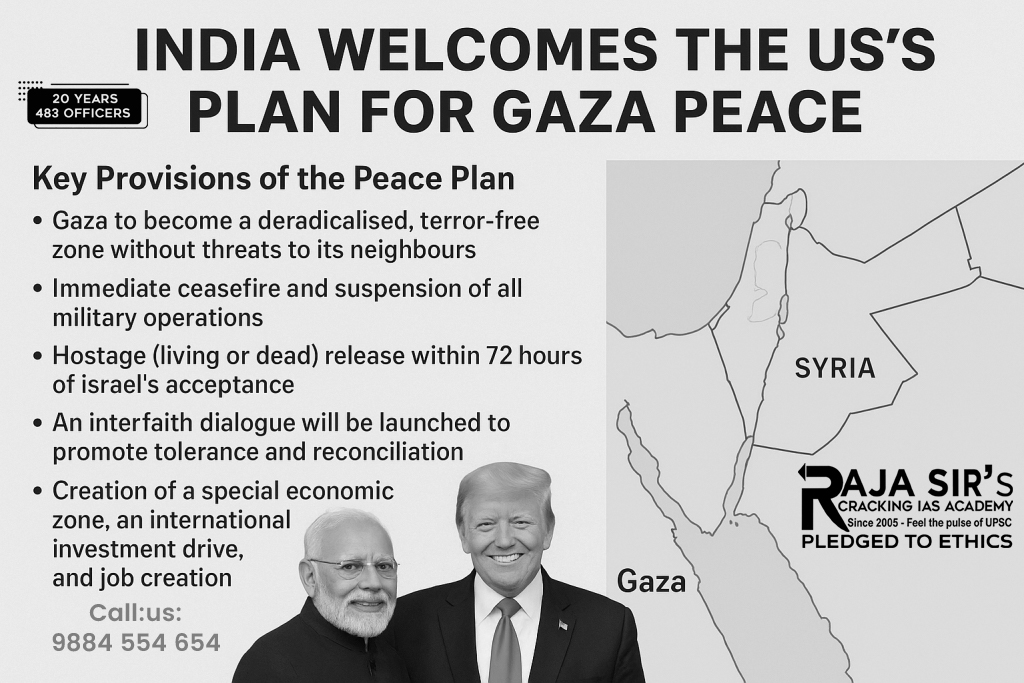- Home
- Prelims
- Mains
- Current Affairs
- Study Materials
- Test Series
Gaza Peace Plan - The View From India
The US Gaza Peace Plan, unveiled in October 2025 as a 20-point initiative by President Donald Trump, aims to end hostilities between Israel and Hamas through immediate ceasefire, hostage exchange, and the demilitarization of Gaza. The plan includes transitional governance under a technocratic Palestinian committee, large-scale humanitarian aid, and an international stabilization force to oversee security and reconstruction. Backed by several Arab nations and welcomed by Israel, the plan holds significance for regional stability and carries important implications for India''s strategic and energy interests.
Features of the Gaza Peace Plan
- Ceasefire and Hostage Exchange: The plan calls for an immediate cessation of hostilities between Israel and Hamas, with all Israeli hostages (alive and deceased) returned within 72 hours of Israel’s acceptance. In exchange, Israel will release Palestinian prisoners, including those detained since October 7, 2023, as well as life-term prisoners.
- Demilitarization and Redevelopment: Gaza is to be transformed into a demilitarized, terror-free zone. All military facilities, tunnels, and weapons manufacturing sites will be dismantled, verified by independent monitors, with amnesty and safe passage offered to disarmed Hamas members wishing to leave Gaza.
- Transitional Governance: Governance of Gaza will be handed over to a temporary body of Palestinian technocrats, supervised by international agencies, with Hamas and other armed factions renouncing any future role in the territory’s administration.
- International Stabilization Force: A new international stabilization force, including personnel from the US, Arab states, and Europe, will oversee security, train Palestinian police, and prevent arms smuggling. Israel will withdraw gradually as the force establishes stability.
- Humanitarian and Reconstruction Aid: Large-scale international aid will be sent for infrastructure, health, and economic redevelopment, aiming to encourage Gazans to stay and rebuild.
- Pathway to Palestinian Statehood: The framework hints at opening dialogue toward Palestinian self-determination and eventual statehood, but does not guarantee US recognition at this stage. Israel’s leadership has publicly ruled out immediate statehood under this plan.
 Implications for India
Implications for India
Diplomacy and Geopolitics
-
- India has consistently supported a two-state solution and peaceful dialogue in the Middle East, emphasizing the rights of Palestinians while maintaining strong strategic and defense partnerships with Israel.
- The peace plan offers India an opportunity to reaffirm its balanced foreign policy—supporting global peace initiatives, Arab partners, and Israel—without antagonizing any party.
Energy Security
-
- Stability in Gaza and the wider Middle East directly reduces geostrategic risks for India’s energy imports, with the region being a vital source of crude oil and LNG.
- A peace settlement can help lower insurance premiums and transport costs for Indian petroleum companies operating in or around the region.
Counterterrorism and Security
-
- The demilitarization of Gaza and the dismantling of terror networks aligns with India’s long-standing stance against terrorism and radical militancy.
- India can share expertise in peacekeeping, policing, and counter-radicalization, potentially joining international development or security missions on invitation.
Humanitarian and Development Engagement
-
- Indian companies and aid agencies could participate in Gaza’s reconstruction, leveraging experience in infrastructure, hospitals, education, and digital governance, consistent with India’s “human-centric” development diplomacy.
- There is scope for trilateral cooperation (India-Arab world-West) on sustainable economic initiatives in Gaza.
Diaspora Concerns
-
- Peace in Gaza would reduce risks for the Indian diaspora across the Gulf states by stabilizing migrant routes, commerce, and safety.
The Gaza Peace Plan is a major geopolitical development, balancing demilitarization, humanitarian aid, and a conditional path to Palestinian governance; its success depends on stakeholder buy-in and credible enforcement. For India, supporting peaceful settlement enhances global diplomatic standing, energy security, and economic linkages, while allowing articulation of a principled, pragmatic policy that embraces multilateralism and regional stability.









 Latest News
Latest News
 General Studies
General Studies